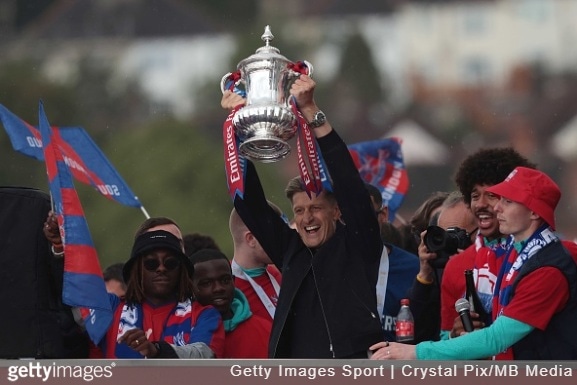Crystal Palace’s unexpected qualification for the Europa League has been at a major obstacle due to UEFA’s multi-club ownership rules, putting European dreams at risk. At the heart of this issue is John Text, an American businessman who owns a 43% stake in Crystal Palace and controls 88% in the Olympics. UEFA rules prohibit individuals or organizations from having a “critical influence” on two clubs participating in the same competition, with the aim of preventing conflicts of interest in the integrity of the tournament.
Crystal Palace president and the club’s public face Steve Parish has lobbyed UEFA to argue that the palace should not be considered part of a multi-club structure. Parrish argues that the role of texts in the club does not constitute a critical influence. The text holds significant stock, but his voting power within the club is limited to 25%, and fellow stakeholders Josh Harris and David Blitzer work with Parish, who generally casting votes.
The text expresses his dissatisfaction with his lack of control. Despite these assurances, UEFA’s main concern lies not in recognition, but in formal legal documents defining ownership and control. The difficult evidence may still be counted against the palace.
This case may be complicated and legal, but it is also a deeply symbolic moment in modern football. Romantic success stories like Crystal Palace reveal that they are increasingly vulnerable to the transformation of sports into a global business enterprise. The club’s amazing season – surpassing expectations and winning a much-needed European spot – risks getting sour and sour due to failures in governance and legal skills, rather than a decline in performance or scandal. This is awful irony for a club that has long been associated with rough resilience and authentic fan culture.
The fans were already experiencing problems before. More than a year ago, palace supporters spread banners at Selhurst Park, denounced the ownership of the Multiclub and directly criticised the text. These early warnings are largely ignored, with ownership focusing on short-term profits rather than long-term compliance. Currently, with UEFA scrutiny intensifying, the consequences of neglect can be severe.
According to current reports, the palace has missed the important march deadline to place the club in blind trust. This is an administrative move that may have resolved this situation. Evangelos Marinakis used this method in Nottingham Forest to avoid a similar conflict between the forest and the Olympiacos. Whether you are watching or disliking the Palace’s European qualifications seduce fate before they are safe, the Palace’s decision has proven to be safe.
The underlying drama is the broader crisis of soccer governance. The sport exists as a reactive example rather than fragmented regulations and positive policy decisions. Currently, multiclub ownership involves more than 400 clubs across nearly 150 ownership networks around the world. Despite the scale of this development, FIFA has never clearly defined what constitutes a “club” in regulatory terms. Without a shared definition, enforcement is ambiguous and inconsistent. Many within the industry have criticized UEFA for lack of transparency and supporting wealthier and more influential clubs.
Certainly, the palace is not one of the European elites, which suggests that the palace is suffering. There is a feeling that famous clubs rarely influence these types of issues. The European Clubs Association (ECA), chaired by PSG President Nasser Al Keraifi, is considered to represent the largest clubs on the continent and their interests. In contrast, Parish is involved in the European Union of Clubs (UEC) seeking to represent medium-sized clubs that are often excluded from elite decision-making circles. Some view this political dynamic as another layer of trouble unfolding in the palace.
The meaning of this case is beyond one club. It symbolizes the current contradictions of soccer. It is a global game built on local identity and is now dominated by a transnational financial and legal framework that often clash with fan values and club traditions. Clubs like Strasbourg and Troy, now part of a multiclub system under large entities like Chelsea and City Football Group, have effectively lost autonomy. They are currently fulfilling the strategic goals of the parent club. This is usually most prominent in the wealthiest and most prominent structures. The concern is that the original spirit of football (competition of community, competition for unpredictability) is eroding in favor of a streamlined, profit-oriented structure.
Crystal Palace’s Europa League qualification could have been one of the great modern football stories. Instead, it becomes a warning story about the consequences of the unregulated ownership model and the UEFA’s lagging regulatory framework. Perhaps we hope that UEFA will take a generous view, recognizing unique situations in the palace and minimal actual control text exercises. But even if the palaces are allowed to compete, the clouds around their achievements remain calmly reflecting how unstable success can be achieved in modern games.
This situation underscores the urgent need for reform. Football authorities must clarify ownership rules and implement them fairly and consistently. Clubs must take greater responsibility to ensure compliance with governance standards. And fans whose voices warned about this outcome long ago, making it impossible for them to be included in something more meaningful in the management of the clubs they support. Their case stands as both a warning and a cry of assembly as the palace awaits UEFA’s decision in worry. Soccer has to decide what it wants to be. It’s a community-driven sports or business-first industry.
In conclusion, Crystal Palace’s Europa League hopes are at risk for ownership models that have grown faster than rules designed to contain it. Unless the governing body of football responds decisively and transparently, palace-like stories will become more common and even more discouraged.









